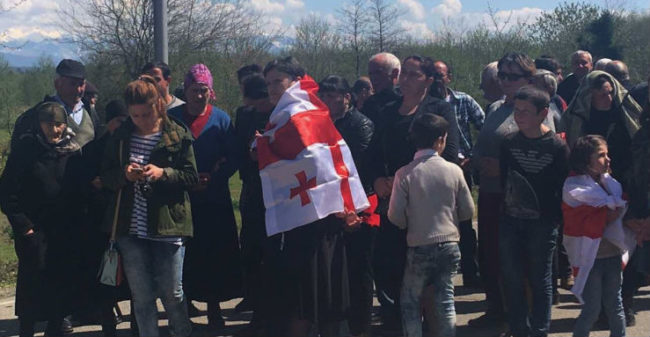

 A father and son were sentenced to 2, and 2 and a half years in jail on 2 August by an Abkhazian court for ‘illegally crossing the border’.
A father and son were sentenced to 2, and 2 and a half years in jail on 2 August by an Abkhazian court for ‘illegally crossing the border’.
Archil Rogava, 59, and Paata Rogava, 25, were arrested on 6 April by authorities in Abkhazia.
A spokesperson for Georgia’s State Security Service confirmed the sentences to OC Media saying that they ‘will take all measures to get these people released using all mechanisms of negotiations’. The court’s decision was ‘clearly illegal’ she added.
Rogava’s family insist on the pair’s innocence, and claim that they were searching for a missing horse when they were stopped and forced to cross the border at gunpoint.
A number of their relatives have held demonstrations since their detention, demanding that the Georgian government make more effort to free them.
On 26 April, members of the family blocked the Enguri (Ingur) Bridge, which leads to the Abkhazian border crossing.
When police ordered them to open the road, Darejan Rogava refused to obey and was arrested, leading to a physical confrontation between police and protesters.
[Read more: Woman arrested in Georgia for protesting Abkhazian detentions]
The issue of the pair’s release was raised by the Georgian side several times during the regular Incident Prevention and Response Mechanism meetings, but the result was not followed.
One such meeting was held in Abkhazia in Gali (Gal) on 25 April.
Kakhaber Kemoklidze, Deputy Head of the Georgian Security Service’s analytical department said after the meeting that Georgia had raised the issue of the Rogavas.
‘The Security Service does its best to help set these people free’, he said.
According to the State Security Service’s 2016 annual report, arrests of people at the Abkhazian border is a major challenge for the service. According to the report, 193 people were arrested in 2016.
[Read more on OC Media: Family protests detentions of two men for crossing into Abkhazia]
For ease of reading, we choose not to use qualifiers such as ‘de facto’, ‘unrecognised’, or ‘partially recognised’ when discussing institutions or political positions within Abkhazia, Nagorno-Karabakh, and South Ossetia. This does not imply a position on their status.









